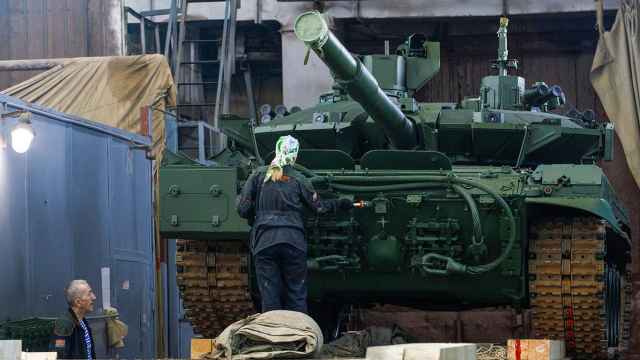Russia faces "considerable" risks of spillover from global economic difficulties even as reduced vulnerabilities will help it avert a downturn similar to 2009, according to the International Monetary Fund.
There's "much less room for fiscal response to adverse developments than there was in 2008," with the country's budget still "heavily dependent" on oil revenue, Odd Per Brekk, the Washington-based lender's senior representative in Moscow, told reporters last week.
The main channel of contagion would be via oil prices, while strains in the euro area may spur more capital flight and squeeze financing for Russian companies, he said. The country's economy, forecast by the IMF to grow 4 percent in 2012 and 2013, contracted 7.8 percent in 2009 after the credit squeeze and global slowdown that followed the collapse of Lehman Brothers Holdings. The downturn crimped demand for commodities, sending the Urals oil blend to as low as $32.34 a barrel on Dec. 24, 2008. The decline was a 77 percent drop from a high of $142.50 in July that year.
In a worst-case scenario following Greece's exit from the euro area, Russia's economy would contract 2.1 percent with the potential for $95 billion in capital leaving the country in a year, Sberbank, the country's biggest lender, said in May.
"Russia is less vulnerable on balance than it was in 2008 to 2009," Brekk said. "We would not expect from — a similar shock — a contraction like we had previously."
Even so, in the case of a sharp decline in oil prices the government would have to seek borrowing in an "uncertain international environment," because it has "much less cash in reserve" than four years ago, he said.
The country deployed the largest stimulus package among Group of 20 nations, totaling 9.8 percent of its gross domestic product in 2009 and 2010, Goldman Sachs Group estimates.
The Central Bank's international currency and gold reserves shrank for a fourth time in five weeks in the seven days ending July 27 to $505.5 billion, bringing the stockpile more than $92 billion below its peak in August 2008. Assets in the Reserve Fund amount to about 3 percent of GDP, almost two-thirds less as a percentage of economic output than the rainy-day fund held in 2008.
The non-oil deficit, which excludes revenue and expenses related to the oil and gas industry, is at 10 percent of GDP and without any prospect for improvement under current plans, according to the IMF.
Brekk said that the government should cut the non-oil deficit by 1.5 percentage points to about 9 percent this year, and to 5 percent by 2015.
He also said the government should increase the retirement age for men and women to 63 by 2030 and 65 by 2050 to maintain spending on pensions at the current level of 8 percent of economic output. Without an overhaul, pension payments will probably double to 16 percent of gross domestic product by 2050, he said.
A Message from The Moscow Times:
Dear readers,
We are facing unprecedented challenges. Russia's Prosecutor General's Office has designated The Moscow Times as an "undesirable" organization, criminalizing our work and putting our staff at risk of prosecution. This follows our earlier unjust labeling as a "foreign agent."
These actions are direct attempts to silence independent journalism in Russia. The authorities claim our work "discredits the decisions of the Russian leadership." We see things differently: we strive to provide accurate, unbiased reporting on Russia.
We, the journalists of The Moscow Times, refuse to be silenced. But to continue our work, we need your help.
Your support, no matter how small, makes a world of difference. If you can, please support us monthly starting from just $2. It's quick to set up, and every contribution makes a significant impact.
By supporting The Moscow Times, you're defending open, independent journalism in the face of repression. Thank you for standing with us.
Remind me later.





